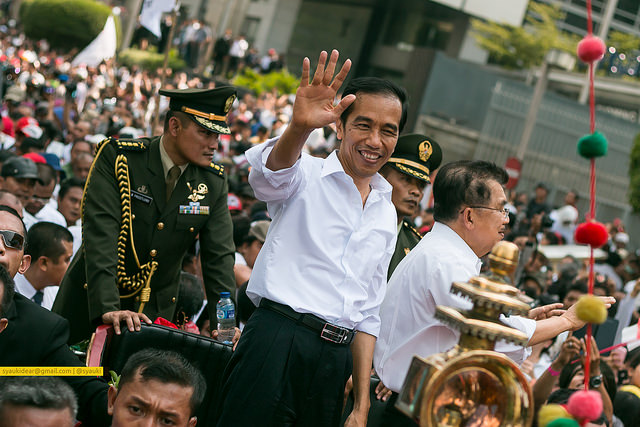A win for Widodo: Indonesia's new police chief
Posted By
John McBeth
on July 18, 2016 @ 12:30

Indonesian President Joko Widodo may have finally come of age as a leader with his decision to ignore seniority—and Indonesian Democratic Party for Struggle (PDI-P) chairperson Megawati Sukarnoputri—in choosing counter-terrorism guru, Tito Karnavian, as Indonesia’s new police chief.
Most analysts had thought he would extend the term of incumbent, Badrodin Haiti, just to avoid having to settle for Megawati’s favourite, controversial deputy police chief Budi Gunawan, who under normal circumstances would have been next in line.
Instead he did the unexpected, elevating the reformist Karnavian from the National Counter-Terrorism Agency (BNPT) to a powerful post he will now theoretically hold for seven years—longer than any of his 22 predecessors except the first one, who served for more than 14 years.
A political greenhorn by any yardstick, it’s taken Widodo 18 months to escape from the PDI-P leader’s shadow and consolidate power, helped to a large degree by the Golkar Party’s recent decision to join what’s now a seven-party ruling coalition. But even with a significant parliamentary majority, Widodo’s still confronted with the onerous task of getting the bureaucracy to implement the government’s 12 deregulation packages that are key to reviving the country’s moribund economy.
Megawati may be still seething over the choice of Karnavian, who was sworn in on 13 July, but ever since he scrapped Gunawan’s nomination for police chief in early 2015 over graft allegations, the president has appeared determined to have his way.
Some analysts believe he smoothed Megawati’s ruffled feathers by offering Gunawan a key government position after he retires next year, perhaps as chief of the National Intelligence Agency (BIN) in place of retired general Sutiyoso. Certainly, Karnavian’s appointment was a major shock for seniority-obsessed Indonesians, who worry he will have difficulty exercising his authority over seven other three-star generals favoured for the job.
For all the resentment it may cause, however, power ultimately trumps seniority in the ranks of Indonesia’s police. As Karnavian put it: ‘Age doesn’t matter because, traditionally, the police have always followed the leader.’ Still, as reform-minded as he professes to be, Karnavian knows he’ll have a fight on his hands if he tries to shake up the 400,000 strong police force, which is generally regarded as the country’s most corrupt institution.
Unlike the Indonesian Armed Forces (TNI), the police report directly to the president. But successive leaders have been unable to make any headway against an entrenched culture that’s refused to change during the past 16 years of democratic rule. Since it separated from the TNI structure in 1999, the police have taken over many of the shady businesses formerly under military control and have resisted efforts by the Anti-Corruption Commission (KPK) to investigate suspiciously-inflated bank accounts.
Until that changes, anti-graft activists see little hope of making serious inroads into the so-far unbreakable alliance that binds together law enforcement, the judiciary, politicians and big business interests.
For all his Western education, including a master’s degree from England’s Exeter University and a doctorate from Singapore’s Nanyang Technology University, Karnavian didn’t get where he is without benefiting in some way from the police patronage system.
‘He may not have liked it, but he’s had to play the game like everyone else,’ says one retired officer familiar with a system where police cadets are compromised from the start of their careers by having to pay just to enter the police academy—and then fork out to gain promotion.
That alone could prove to be an inhibiting factor, just as his appointment will put a cap on the promotion ambitions of four classes of his superiors. ‘Immediate and revolutionary reforms can cause major upheavals’, he noted in an interview with Tempo magazine. But seven years as police chief is a long time and given Karnavian’s track record in counter-terrorism alone, including the killing of Malaysian bombers, Azahari bin Husin and Noordin Mohammad Top, Indonesia can expect to look forward to a more professional force at least.
Karnavian’s had a better ride than most because he was among the cream of officers— mostly the narcotics and criminal investigation divisions—hand-picked for counter-terrorism operations in the wake of the devastating 2002 Bali bombing.
Trained by American and Australian instructors, the 500-strong Detachment 88 has proven to be a revelation, killing and arresting hundreds of militants and effectively destroying the Jemaah Islamiyah network, responsible for a string of deadly bombings between 2002 and 2009. But it’s also been lavished with its own housing, specialized equipment and, perhaps more importantly, a much better pay scale, believed to be similar to that given police investigators seconded to the Anti-Corruption Commission (KPK).
Sources who know him say Karnavian does have a genuine desire to bring change to the wider police force, despite the fact he can expect little help from any of the two or three-star generals under him. In fact, he may have to dig down to the brigadier-general level before he can find trustworthy allies who share his belief that the police should shed their old, military-style thinking and engage in the sort of genuine community policing Indonesia requires.
As much as President Widodo may want to see that transformation, he knows better than anyone that it will almost certainly still be a work in progress at the end of his term in 2019.
John McBeth is a Jakarta-based correspondent.
Article printed from The Strategist: https://www.aspistrategist.org.au
URL to article: https://www.aspistrategist.org.au/win-widodo-indonesias-new-police-chief/
[1] did the unexpected: http://www.thejakartapost.com/news/2016/06/15/top-cop-candidate-wins-favor-over-seniors.html
[2] interview with Tempo magazine: http://en.tempo.co/read/news/2016/06/21/241781846/Tito-Karnavian--Reforms-will-cause-major-upheavals
[3] Detachment 88: https://en.wikipedia.org/wiki/Detachment_88
 Print This Post
Print This Post